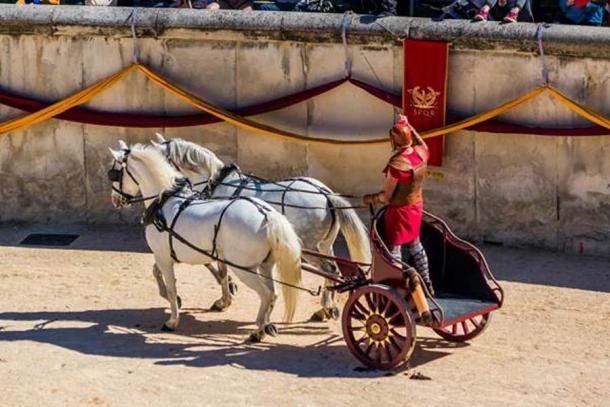Top Roman Charioteer Was Worth More than Cristiano Ronaldo!
In 2020, Cristiano Ronaldo, a five-time FIFA player of the year became the first team-sport athlete to surpass $1 billion in career earnings. It is hard to imagine anyone topping that, but in the ancient world, someone did! Gaius Appuleius Diocles, a Roman charioteer, was the wealthiest athlete in history, earning the equivalent of $15 billion in today’s dollars.
For the ancient Romans, nothing was more captivating and dramatic than chariot racing . Organized by emperors to boost their popularity and prestige among the masses, they were lavish spectacles infused with elaborate rituals. They would begin with a sacred procession through the streets leading up to the grand arena, the Circus Maximus , where up to 200,000 spectators waited with bated breath. The charioteers would captivate their audience with displays of highly-skilled horsemanship, tactical ingenuity and daring courage as they dangerously raced around the track. Many would be thrown from a broken chariot and trampled by the charging horses or get caught in the reins and dragged to their deaths. Most charioteers were dead by their mid-20s.
But there was one who stood out among the rest - Gaius Appuleius Diocles , who not only survived a 24-year-long career but went on to amass a fortune that was five times the earnings of the highest paid Roman governor and enough to feed the entire city of Rome for a year.

Gaius Appuleius Diocles was born in 104 AD in Lamecum, the capital city of Lusitania, province of Emerita Augusta (modern-day Portugal). He is believed to have started racing at the age of 18 in Ilerda (modern-day Catalonia) and quickly gained a reputation good enough to get himself called up to the ‘big leagues’ in Rome. The 2nd-century star did not make his money through sponsorships or marketing gambits, as many of today’s athletes. Instead, the earnings came solely from the 1,462 races he won.
However, unlike the celebrity status of today’s top-earning athletes, and despite the pomp and prestige of the event itself, charioteers were at best low-class citizens. Openly competing for money was seen as socially and morally disgraceful and excluded them from the privileges of full citizenship or from holding public office. Many were slaves, and even the best charioteers remained in the same class of citizens as actors, prostitutes, gladiators, and funeral directors.
Diocles retired from charioteering at the age of 42 and slipped away quietly to an expanse of land in the Italian countryside, where he lived out the remainder of his days with his family.
Read more: Gaius Appuleius Diocles, The $15 Billion Athlete of the Ancient World
Top image: Modern depiction (1876) by Jean Léon Gérôme of a chariot race in Rome's Circus Maximus (Public Domain)
By Joanna Gillan


That is fascinating!! What an interesting look inside the world of ancient athletes. Thanks!